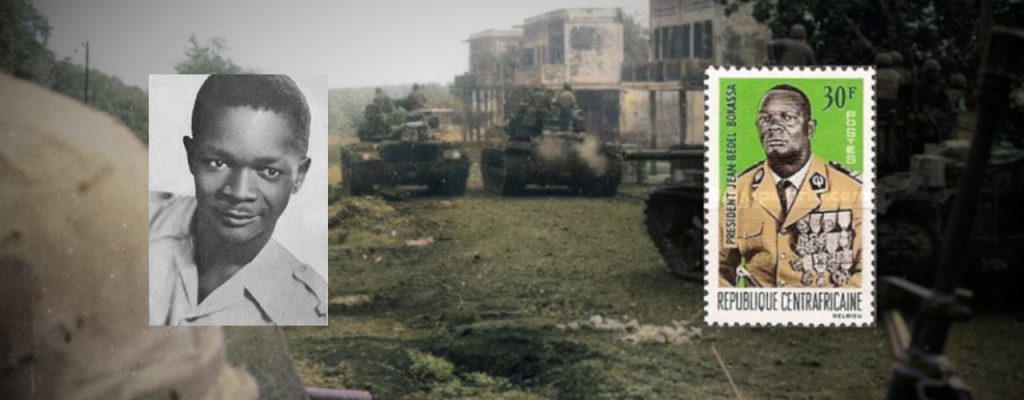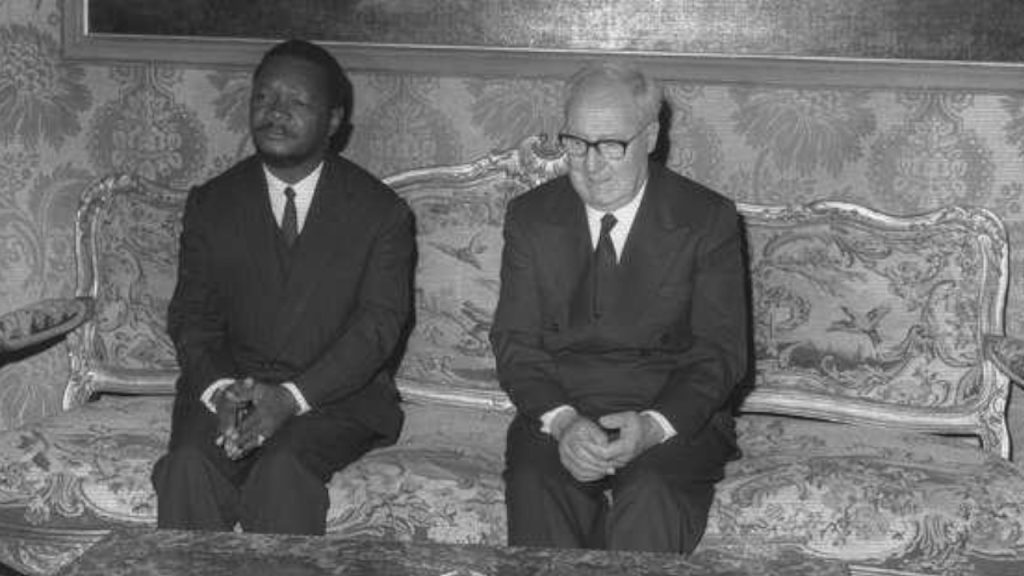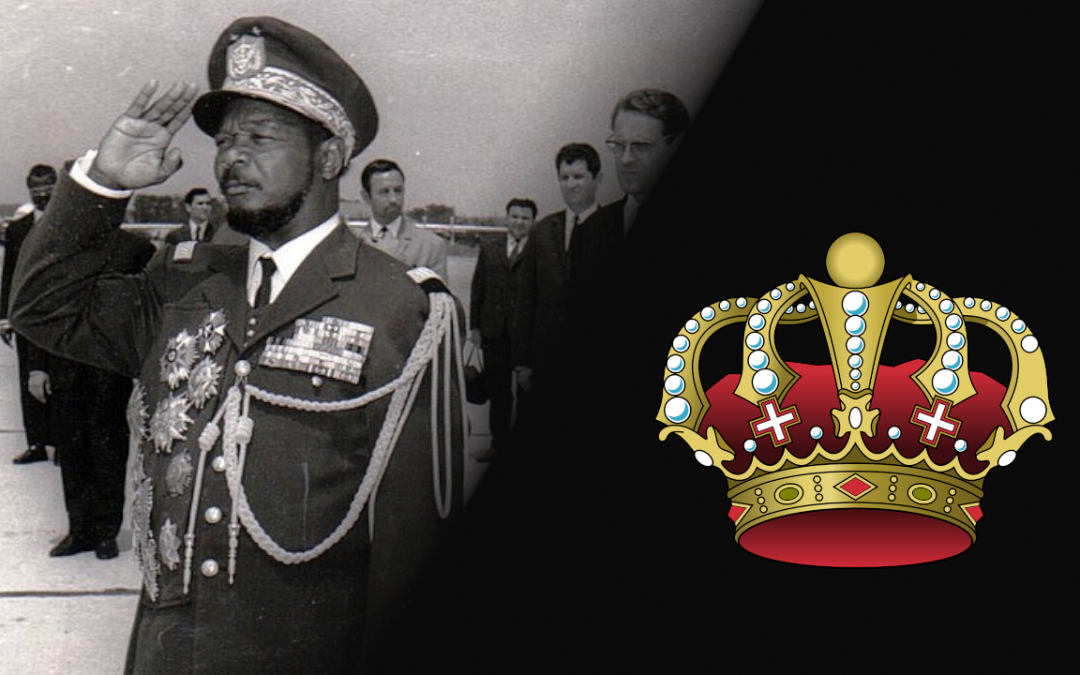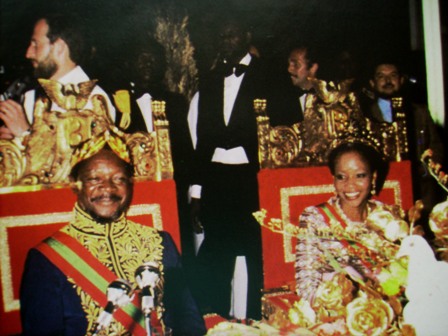Jean-Bedel Bokassa is by far the most flamboyant and audacious African dictator of all. That’s saying a lot considering Colonel Gaddafi is also in that category. Like Idi Amin he was rumored to be a cannibal. But unlike even Idi he had the gall to proclaim himself an emperor. Yet, strangely, he is not as well known as many other tyrants of the modern era. But who was the man behind the madness?
A Terrible Time
Jean-Bédel Bokassa had a surprisingly brutal childhood. Not surprising since he was born in French colonial Africa in 1921. But surprising since his father was a prestigious tribal chief. At the time, native leaders such as his father served at the behest of French authorities. So it was bad luck for the young Bokassa that his father was independent minded. After a miserable period of sending members of his tribe to perform hard labor for the French, the chief grew increasingly dissatisfied with the order of things. So one day he decided to simply stop obeying orders. No longer would he be merely a lapdog for his colonial overlords. And boy was that a mistake. The French immediately had him deposed and arrested. Showing no reverence for his status as chief, he was chained up and beaten to death in the town square.
It was a traumatic event for all who lived in the town, but none suffered from it the way Jean-Bedel Bokassa did. Being just six years old, it would be difficult for us to truly understand how it must have felt for the young boy to witness his father’s murder. The fall in status of the Bokassa family only compounded the grief. None took it harder than Jean- Bedel’s mother – who just a week later took her own life. From here the story didn’t get much better for the young boy. Now an orphan, he was sent to a school run by French missionaries. All in all it wasn’t a bad education. One might even consider him lucky if not for the fact his previous life and position in society was so cruelly taken from him.
And so his young mind was molded by the education provided to him, seeing Jean-Bédel become a surprisingly well adjusted person. After training as a cook during his teenage years he would join the French colonial troops as a soldier. It is unfortunate, though, that the second world war broke out the same year he enlisted. So while he did not want or expect to become involved in a large scale war so soon, fate had a different plan. But at least the bulk of fighting for him would be in Africa. With Germany soon defeating and invading France, colonies of the French empire were given a difficult choice. Either they could remain loyal to the old France and continue the fight, or they could surrender. A puppet government had been established in France by the German military – known as Vichy France.
The Vichy government claim to represent France, demanding the allegiance of all overseas colonies. But the remnants of the French military in Africa, including the French colonial troops, fiercely resisted. This is what the young Bokassa would dedicate the following years of his life. The fighting was intense, seeing him promoted to sergeant major in 1941. Slowly but surely they were able to push Vichy and German forces out of Africa, setting up the colonies as a base from which to wage war against Axis’ positions. Then in 1944, when Germany had been bled weak by the fortunes of war, he was sent to fight in Europe. First it would be France, where he learned how to best use modern military equipment. Then it was on to Germany, where allied soldiers would taste ultimate victory.

After the war he decided to stay on as a soldier, having grown accustomed to the profession and way of life. The cessation of fighting gave him the opportunity to train as an officer, attending a prestigious academy in France. Then as a communications officer he was sent to Vietnam, which at the time was a French colony. In Vietnam he married a local girl and together they had a daughter. But while he was there a war broke out that would plunge the region into decades of uncertainty. Known as the first Indochina war, it was a true struggle for independence. More than 400 thousand soldiers died in the conflict, along with countless civilians over the seven years it was fought. But in 1954 the French accepted defeat, allowing the countries of that area to form independent states.
Interestingly, Bokassa served in Indochina until 1953 – just one year before it ended. So when he headed back to France, he left his wife and child behind in Vietnam. They assumed the war would not end so soon, and that Bokassa would in time be redeployed in Indochina. But he never was. It’s unclear if he was ever reunited with his family. So many were separated in the chaos of those years of war. So I would not be surprised. The next half decade in the life of Jean-Bedel Bokassa was spent in France, training and teaching alike. Then in 1958 he finally returned to Africa.
Back To Africa
In his homeland of Ubangi-Shari he found life easy in comparison to the global and regional wars he was now accustomed to. Ubangi-Shari was indeed undergoing the process of breaking away from France, but this process was mostly peaceful. In 1960 it broke free entirely as the Central African Republic. So in time Bokassa transitioned from the French military to the new military of the Central African Republic. It was now that his background as the son of a tribal chief came in handy. As it turned out, his cousin David Dacko was serving as the first ever president of the Central African Republic. And with blood being thicker than water, Jean-Bedel Bokassa was put in charge of the military. By accident of birth and coinciding with wartime experience, he became one of the most powerful men in the entire country. You would be right to be impressed by that.
But it might not be quite as imposing a position as you imagine. The army at the time had just 500 men in total. So in a way he was a big fish in a small pond. Accordingly, he was a common face at official occasions. In fact, he grew so bold as to openly scorn members of the government at times. President Dacko was not alarmed by this insolence, believing his cousin would never even imagine challenging his position as leader. But that would later prove to be a miscalculation. He even gave Bokassa a position within the government, fearing so little ambition within his relative. In truth the president was utterly distracted by the dire political climate. The central government was weak. Foreign insurgents and domestic rebels were wreaking havoc on the young nation’s borderlands.
The Central African Republic was still reliant on France for diplomatic and economic support – and even with that she remained one of the world’s poorest countries. In fact, it was endlessly close to national bankruptcy. But eventually president Dacko saw Jean-Bédel Bokassa for the threat he was. Replacing army officers with ones not loyal chiefly to Bokassa was his first step. The next step was publicly admonishing him in an attempt to tarnish the reputation of the aggressive military leader. At one point he even exiled Bokassa to France. It is unclear why he eventually allowed him back into the country. Perhaps it was the nepotist bias which has seen so many dictators turn a blind eye to the ambition of their blood relatives. Or perhaps he thought he could outmaneuver Bokassa. Politics is, after all, much different to military matters. Whatever the reason is, we’ll never know.
It was late on New Year’s Eve of 1965 that Jean-Bédel Bokassa launched his takeover. Having conspired with a group of military officers still loyal to him, they quietly moved into key positions through the nation. Caught off guard by such a bold power grab on New Year’s Eve, the government put up virtually no resistance. In just a couple of hours the capital city was captured by Bokassa and co. Other major cities would soon follow. The only problem is they were unable to find president Dacko. Soldiers scoured the capital and presidential palace but no sign of him was found. He did eventually turn up but for a while it looked like Bokassa had miscalculated. Dacko was taken straight to prison, while all other prisoners were released. Jean-Bedel Bokassa was now the man in charge. His image was posted across the nation, and voice broadcast across the radio.

He dismissed the legislature and tore up the constitution, declaring himself an absolute ruler. Claiming he would only hold power for as long as instability plagued the nation’s political system, Bokassa then introduced a series of authoritarian laws. For example, anyone unable to prove they have employment could end up in jail. Any protest of Bokassa’s rule could also land a person in jail. Some of his policies were actually forward thinking and surprisingly liberal – like the banning of bigamy and female circumcision. But the bulk of his decelerations were brutally backward. Bokassa also fell prey to a kind of temptation dictators all too often fall victim to, self-indulgence. To put it simply he was spending money the Central African Republic did not have on things he and his allies did not need. Rather than securing the support of allies, this actually pushed some of the power players away.
Among those put off by the spending was Alexandre Banza, a key player in the coup that swept Bokassa to power. For three years Banza would slowly plan his own coup against Bokassa, believing he would make a better president. Considering what would come next, a lot of people now share that belief. But it was not to be. As the years went on the economy did not improve and few foreign nations officially recognized the government of the Central African Republic. Many grew discontented with the way things were, at every level of society. So by early 1969 Banza had grown so bold as to reveal his intention to seize power, openly admitting it to a number of high ranking officers. Predictably, he was betrayed.
When on the 9th of April he arrived at a military base to launch the coup, he was set upon by a group of soldiers loyal to Bokassa. They shoved him into the boot of a car and drove him directly to Jean-Bedel Bokassa. What followed next will not surprise you: torture, execution, and internment to an unmarked grave. The exact nature of his treatment is unclear, as told by conflicting reports. But each report is brutal, painting a picture of the black heart of Bokassa’s regime. Other threats and power rivals were treated in similar ways as Banza was. By the early 1970s Jean-Bedel Bokassa had secured his position enough to declare himself president for life. From there he and his nation seemed to stagnate, seeing little change in following years.
A boon came in 1975 when France recognized him and began to do business with the Central African Republic. The cold war was in full swing and France was building up it’s nuclear arsenal. But to do that they needed uranium, a highly expensive and controlled substance only a handful of nations can produce. It just so happens that the Central African Republic is one of those nations. So, at a discounted rate, Bokassa supplied healthy amounts of uranium to France in exchange for diplomatic support. Next came diplomatic relations with China and several other emerging nations. Such foreign partnerships gave Bokassa a sense of security.
The Emperor
Finally there was money coming in and finally the public could see he was improving things. But like his good friend and business partner, Colonel Gaddafi, he let the success go to his head. He came to see himself as an African Napoleon, despite never conquering any foreign land and ruling over one of the poorest countries on earth. So in 1976 he decided to officially convert the Central African Republic to an empire. The main benefit of this was that he could crown himself Emperor. He wanted to go down in history as the first in a long lines of African monarchs. This might sound bizarre, but to be fair, every monarchy started somewhere. Modelling his heraldry and imperial image directly on that of Napoleon, he actually chose a date for his coronation because it was the anniversary of Napoleon’s.
For the ceremony, a team of French craftsmen were paid millions of dollars to create a grand, gold plated throne. A royal carriage too was imported, and a crown struck. His uniform was designed and created by the same company which created Napoleon’s uniforms centuries before. In his hand was an equally grand golden and jewel encrusted imperial scepter. It is believed he spent 5 million US dollars just on jewelry. That alone would have made his grand ceremony a surreal experience. But on top of that he had the entire capital city cleaned and removed of dissidents. Anything that could give the impression of poverty was removed. But in truth no one was fooled. Despite Jean-Bedel Bokassa inviting a long list of foreign rulers and monarchs, virtually none chose to attend. No foreign president and only one African leader showed up.
There were foreign dignitaries in attendance, but far less than he expected. Then just before 11 AM Bokassa was crowned emperor on the 4th of December 1977, sitting upon a ridiculous throne. Yet the over-the-top nature of his coronation ceremony backfired. The international community found it funny. Newspapers and comedy shows openly mocked him, with the images of his giant throne speaking for themselves. Bokassa did take pleasure in the fact he was not officially known as an emperor, he was not seen as the equal to other monarchs. Quite the opposite, actually. The ceremony is now regarded as one of the biggest mistakes ever made by a dictator, African or otherwise. It’s estimated to have cost at least 20 million US dollars, which at the time was around 25 percent of his government’s budget for that year.
Considering the population of the Central African Empire was still largely impoverished, the extravagance of all this was a kick in the teeth economically. Bokassa announced the empire would be a constitutional monarchy like Japan or the UK. But in reality he was an absolute monarch and remained a dictator for the remained of his time in office. And as it would turn out, he would only remain in power for another two years. It might surprise you he lasted that long but dictators often have a way of clinging to power by their finger nails. With foreign support steadily reducing, Bokassa grew increasingly violent. Then in late 1979 when he ordered the execution of dozens of children, international outrage was sparked. Now finally the French government would move against him, sending in army special forces to assist rebels.
Fall of An Empire
On the 21st of September they removed Jean-Bedel Bokassa from office and installed a new, more sensible leader. There was little opposition to the overthrow. By this point even the most staunch Bokassa loyalists were in despair. No one had hoped his premiership would unfold the way it did. Bokassa himself was unable to resist, being in Libya on a state visit. Amazingly, the new leader chosen by France was David Dacko – the cousin of Bokassa who himself was betrayed and forced into exile years before. So that’s weird.
The Central African Empire was re-converted to the Central African Republic, and some measure of normality was restored. Sure, the history of the country has since not gotten much better, seeing a succession of dictatorships and civil wars. But at least they have not had another emperor with a giant golden throne. As for Jean-Bedel Bokassa, he for some reason was granted asylum in France. For seven years he lived a comfortable life in France, where he owned a historic Château. Then in 1986 he made his worst decision yet, returning the the Central African Republic. Perhaps he expected to be greeted as a hero – he was certainly deluded enough for it. But no. The moment he arrived in his home country he was arrested. During his exile a court in the Central African Republic had found him guilty of capital crimes and sentenced him to death.
So authorities were stunned when he chose to return. Despite the previous verdict, he was again put on trial. Jean-Bédel Bokassa was charged with 14 serious crimes, ranging from corruption and assault to cannibalism. With a mountain of evidence against the former ruler, you won’t be surprised to hear he was sent to prison. In 1988 he sentence was reduced from the death penalty to life in prison, and in 1996 he died while serving his sentence. He was survived by at least 17 wives and god knows how many children. He will likely go down in history as the sole emperor of the Central African Republic.
But a big part of his legacy is also the abject poverty still experienced by his nation today. Yes, the country is landlocked and poor in physical resources outside of uranium. He cannot be blamed for these facts. But the reckless spending during his time in power hindered the development of the country more than almost anything else. The population starved and institutions wilted for as long as he was in office. The chaotic nature of his removal too made things worse. The country is actually in the middle of an ongoing civil war right now. Part of the blame for that surely lies with Jean-Bedel Bokassa.


